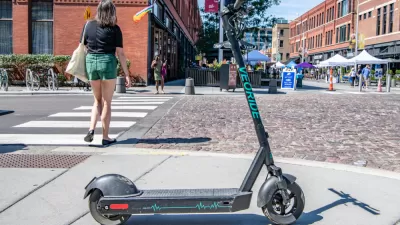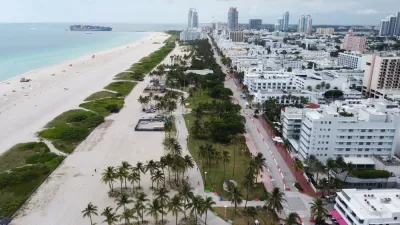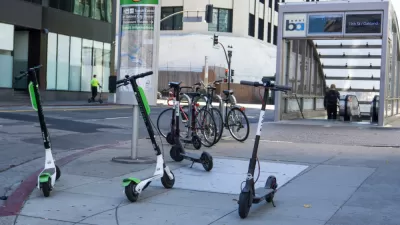Proposed regulations would limit the popular micromobility devices to two operators, impose new fees, and require more accountability for safe scooter use and parking.

After a surge in their popularity during the pandemic, San Diego’s rental e-scooters may see a dramatic decrease in their fleet. “In August 2021, NBC 7 reported a post-pandemic surge of 49% in the number of permitted motorized scooters.” Now, as reported by Artie Ojeda, “Under the rules proposed last week by the council’s Active Transportation and Infrastructure Committee, the number of operators could be significantly reduced to as few as two.” Additionally, “Chosen companies would be required to pay an annual $20,000 fee in addition to $0.75 a day per device. The number of devices would be capped at 8,000.”
To address concerns about sidewalk riding and use of public space, “Other rules would allow no more than four devices to be parked in a city striped corral. Scooters would not be allowed on sidewalks.” According to the article, “the proposed regulations are designed to make operators more accountable by requiring more data on self-enforcement.”
Operators of the micromobility devices have expressed support for the proposed regulations. The article quotes Sara Dodrill of Spin saying, “More regulation on operators allows us to continue investing in the infrastructure, technological, and operational innovations needed to make high quality and affordable shared micromobility services for San Diego residents and visitors.”
FULL STORY: New Rules Could Drastically Impact Use of Motorized Scooters in San Diego

Alabama: Trump Terminates Settlements for Black Communities Harmed By Raw Sewage
Trump deemed the landmark civil rights agreement “illegal DEI and environmental justice policy.”

Planetizen Federal Action Tracker
A weekly monitor of how Trump’s orders and actions are impacting planners and planning in America.

The 120 Year Old Tiny Home Villages That Sheltered San Francisco’s Earthquake Refugees
More than a century ago, San Francisco mobilized to house thousands of residents displaced by the 1906 earthquake. Could their strategy offer a model for the present?

Opinion: California’s SB 79 Would Improve Housing Affordability and Transit Access
A proposed bill would legalize transit-oriented development statewide.

Record Temperatures Prompt Push for Environmental Justice Bills
Nevada legislators are proposing laws that would mandate heat mitigation measures to protect residents from the impacts of extreme heat.

Downtown Pittsburgh Set to Gain 1,300 New Housing Units
Pittsburgh’s office buildings, many of which date back to the early 20th century, are prime candidates for conversion to housing.
Urban Design for Planners 1: Software Tools
This six-course series explores essential urban design concepts using open source software and equips planners with the tools they need to participate fully in the urban design process.
Planning for Universal Design
Learn the tools for implementing Universal Design in planning regulations.
Clanton & Associates, Inc.
Jessamine County Fiscal Court
Institute for Housing and Urban Development Studies (IHS)
City of Grandview
Harvard GSD Executive Education
Toledo-Lucas County Plan Commissions
Salt Lake City
NYU Wagner Graduate School of Public Service





























